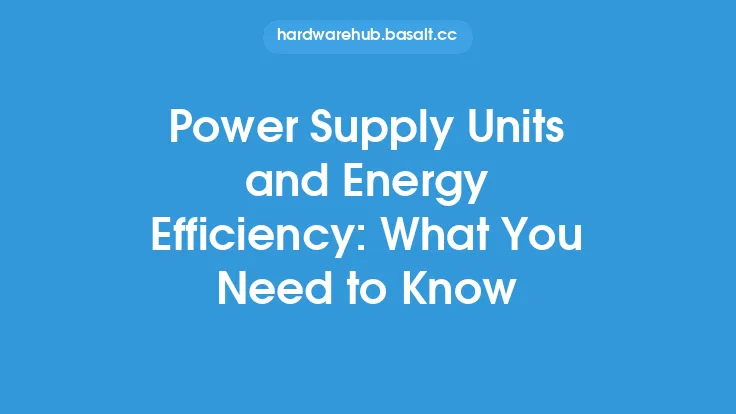When it comes to power supplies, efficiency is a critical factor to consider. A power supply's efficiency determines how well it can convert the input power from the mains to the output power that is used by the computer's components. In recent years, there has been a growing emphasis on power supply efficiency, driven by the need to reduce energy consumption and minimize the environmental impact of computers. As a result, various standards and ratings have been developed to measure and certify the efficiency of power supplies.
Introduction to Power Supply Efficiency Standards
The most widely recognized standard for power supply efficiency is the 80 PLUS certification program. This program was launched in 2004 by Ecos Consulting, a company that specializes in energy efficiency and sustainability. The 80 PLUS program sets standards for power supply efficiency, with different levels of certification based on the power supply's efficiency at various loads. The certification levels are: 80 PLUS Bronze, Silver, Gold, Platinum, and Titanium. Each level requires the power supply to meet specific efficiency standards at 20%, 50%, and 100% loads.
Understanding 80 PLUS Certification
To achieve 80 PLUS certification, a power supply must meet the efficiency standards set by the program. The standards are based on the power supply's efficiency at three different loads: 20%, 50%, and 100%. The efficiency is measured by calculating the ratio of the output power to the input power, and then multiplying by 100 to get a percentage. For example, if a power supply has an output power of 650W and an input power of 800W, its efficiency would be 81.25% (650W / 800W x 100). The 80 PLUS certification levels are based on the following efficiency standards:
- 80 PLUS Bronze: 82% efficiency at 20% load, 85% efficiency at 50% load, and 82% efficiency at 100% load
- 80 PLUS Silver: 85% efficiency at 20% load, 88% efficiency at 50% load, and 85% efficiency at 100% load
- 80 PLUS Gold: 90% efficiency at 20% load, 92% efficiency at 50% load, and 90% efficiency at 100% load
- 80 PLUS Platinum: 92% efficiency at 20% load, 94% efficiency at 50% load, and 92% efficiency at 100% load
- 80 PLUS Titanium: 94% efficiency at 20% load, 96% efficiency at 50% load, and 94% efficiency at 100% load
Other Power Supply Efficiency Standards
In addition to the 80 PLUS certification program, there are other standards and ratings that measure power supply efficiency. These include:
- Energy Star: This is a program run by the U.S. Environmental Protection Agency (EPA) that sets standards for energy efficiency in a wide range of products, including power supplies. To qualify for the Energy Star label, a power supply must meet specific efficiency standards at various loads.
- ErP (Energy-related Products) Lot 6: This is a European Union directive that sets standards for the energy efficiency of power supplies. The directive requires power supplies to meet specific efficiency standards at various loads, and also sets limits on the amount of power that a power supply can consume when it is in standby mode.
- Climate Savers Computing Initiative: This is a non-profit organization that aims to reduce the energy consumption of computers and other IT equipment. The organization sets standards for power supply efficiency, and also provides guidance on how to choose energy-efficient power supplies.
Technical Aspects of Power Supply Efficiency
Power supply efficiency is determined by a number of technical factors, including:
- Topology: The topology of a power supply refers to its internal design and layout. Different topologies can affect the efficiency of a power supply, with some topologies being more efficient than others.
- Components: The components used in a power supply can also affect its efficiency. For example, power supplies that use high-quality capacitors and inductors tend to be more efficient than those that use lower-quality components.
- Switching frequency: The switching frequency of a power supply refers to how often the power supply switches on and off. A higher switching frequency can result in higher efficiency, but it can also generate more heat and noise.
- Cooling system: The cooling system used in a power supply can also affect its efficiency. Power supplies that use high-quality cooling systems tend to be more efficient than those that use lower-quality cooling systems.
Measuring Power Supply Efficiency
Measuring power supply efficiency can be a complex task, as it requires specialized equipment and expertise. There are several methods that can be used to measure power supply efficiency, including:
- Load testing: This involves loading the power supply with a known amount of power and measuring its efficiency at different loads.
- Efficiency testing: This involves measuring the power supply's efficiency at different loads and calculating its overall efficiency.
- Power analysis: This involves using specialized equipment to analyze the power supply's power output and calculate its efficiency.
Conclusion
In conclusion, power supply efficiency is a critical factor to consider when choosing a power supply. The 80 PLUS certification program and other standards and ratings provide a way to measure and compare the efficiency of different power supplies. By understanding the technical aspects of power supply efficiency and how to measure it, consumers can make informed decisions when choosing a power supply. Additionally, manufacturers can use this information to design and build more efficient power supplies that meet the growing demand for energy-efficient products.





